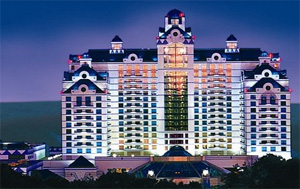
Foxwoods Resort Casino
Tribal Casinos also known as Native American or Indian Reservation Casinos have been around for decades in the United States and Canada since the mid 90’s. Many tribes have been involved in establishing gaming in their territories with some further afield in Canada providing licensing jurisdictions for online casinos even when online gaming’s legality became questionable in the America.
So why do these casinos exist and how is it that they seem to operate independently of everything else in America? The story is a fascinating one with a rich history! Let’s take a brief look at it now…
In the 1970’s a married Chippewa couple residing on Indian lands received a property tax bill which they refused to pay. The issue was challenged in court and the couple lost the case in both their district and the Supreme Court of Minnesota. They then pleaded their case before the US Supreme Court whose judges decided that US states did not have the authority to tax Indian natives on Indian reservations, nor were they allowed to regulate Indian activities on reservations.
Then in 1988 US Congress passed the Indian Gaming Regulatory Act, which recognized “the right of Native American Indian tribes in America to establish gambling facilities on their reservations as long as the states in which they are situated have some form of legalized gambling“, thus ensuring Tribal sovereignty on Indian reservations and lands across the US.
This decision sparked the birth of Indian Gambling operations and soon enterprising Native Americans were setting up Bingo Halls across the country on Indian Reservations which later blossomed into casinos and gaming establishments.
By 2011 there were 460 gambling operations run by 240 tribes with total annual revenue of $27 billion. The most famous of these establishments include the Pechanga Resort and Casino in Temecula and the Morongo Casino, Resort and Spa in Cabazon California as well as the Foxwoods Resort Casino and Mohegan Sun Resort and Casino, both in Connecticut.
Not all casinos however are managed by the tribes themselves, oftentimes outside management companies are involved as is the case with Cherokee Casino in North Carolina, the Ak-Chin Casino in Arizona and the Prairie Band Casino in Kansas, all of which are managed by Harrah’s and the Mohegan Sun which is managed by the tribe in conjunction with a South African Casino group.
While some tribes have benefitted considerably from the financial gains they have accrued from their reservation casinos and gambling establishments, many others have not been as fortunate. This is largely due to geographical location of the various tribes.
While some reservations like those that Foxwoods and the Mohegan Sun casinos are located on are situated halfway between New York and Boston, many Native American lands are located far from the infrastructure and large cities whose populations can support their gaming outfits, which in turn support the economic development of these tribes. Some tribes have, with the help of casino investors attempted to establish casinos off reservation, yet only three successful casinos have been opened to date.
Even those that have enjoyed overwhelming success were hit by the 2007 recession and the economic downturned that followed. By 2012, many of the big names like Foxwoods and the Mohegan Sun were reportedly billions of dollars in debt and are still fighting to stay afloat.
Time will tell if they are able to turn it all around but many remain hopeful as generally casinos do generate huge profits, and with the lack of government taxation being applied to Indian casinos, they do stand a fighting chance.



